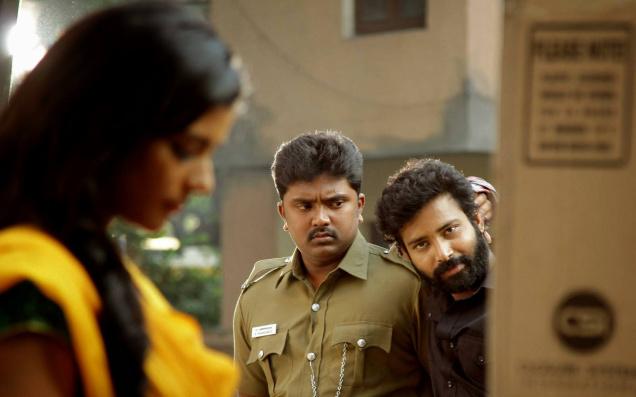-Sudhir Srinivasan

Thirudan Police screams identity crisis. Like its hero, it doesn’t quite know what it wants to be. Like a thief pursued by cops, it changes directions unpredictably. It starts off hinting at a 7G Rainbow Colony type of love story, where the idle, good-for-nothing Vishwa (Attakaththi Dinesh) woos the new girl in the neighbourhood (Iyshwarya Rajesh). Like the Selvaraghavan film, it explores father-son issues, with the policeman father (yesteryear actor Rajesh) wanting to make something of his son, who for his part is content watching night shows with money stolen from dad’s wallet. Police dad, thirudan son.
Then, the film takes a serious turn. It switches almost into expository mode and takes on shades of a Bhandarkar film, as it begins to show the life of a constable and the harsh realities of police work. Buying vegetables for a senior officer, running errands for his family, standing for hours under the sun without food… you get the idea. This is interspersed with monologues about the pride in being a policeman and cracks about policing. “Always pick on hatchbacks, never sedans,” advises a colleague.
Then, the movie becomes a revenge saga with Vishwa realising his father’s nobility and deciding to track down his killer (the hilarious Rajendran). Vishwa’s singular objective is to bring this man to justice. However, that’s not too difficult because both of them are almost always in the vicinity of each other, thanks to the miracle of coincidences. Perhaps it’s the universe, as Paulo Coelho said in The Alchemist, conspiring to help Vishwa get what he wants.
Finally, the movie becomes a comedy, the best of all its avatars. The last 15 minutes leave you in splits — Rajendran’s mere presence evokes laughter. Just like someone moves from job to job before finally discovering what he’s good at, the film at last manages to identify its trump card.
Vishwa’s struggle to shed a tear following the death of his father in the beginning is a great touch. But you realise that Caarthick Raju’s real strength is comedy. A Ramarajan-style punch quite early in the film (where the fist passes through face after face leaving behind a trail of fallen bodies) signals this. The climax sequences confirm it. You’re happily willing to suspend all disbelief when the scenes are as funny as they are at the end.
And then, your laughter is brought to a screeching halt when the film brings in another monologue about the piety of policemen. Just before the end credits, there’s even a dedication to ‘all the fathers’. For a film that uses a son’s grief for laughs (not that it’s wrong), it’s quite an audacious dedication. Accompanying the end credits are pictures of the cast and crew with their respective fathers, Burma-style. As you walk out, you can’t but wonder if the director, after noting all the laughter at the end, rues his decision not to have made a full-fledged comedy.
